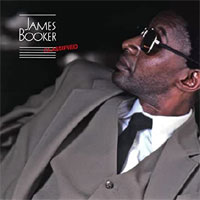James Booker • Classified
Irma Thomas • After the Rain
ew Orleans, Louisiana. Nowhere in America is music more intricately woven into the fabric of daily life than it is in this port city. Categorizing New Orleans music is tricky because the multitude of styles represented there are as varied as recipes for gumbo and étouffée. One thing is certain -- New Orleans musicians and singers are a fiercely committed and free-thinking bunch. Two fine examples of this independent spirit can be heard on Craft Recordings’ new reissues of Irma Thomas’s 2006 Grammy-winning After the Rain and James Booker’s 1982 blues gem Classified. Of these two recordings, Classified is the better representation of New Orleans’ quirky charm. Inspired by musical heroes ranging from Professor Longhair to Liberace, Booker was unique even by New Orleans standards. When tasked with describing the man, New Orleans sage Dr. John Rebennack once opined that Booker was, “the best black, gay, one-eyed junkie piano genius New Orleans has ever produced.” And so it was no easy task for the album’s producer, Scott Billington, to capture Booker’s lively creative energy in a studio bottle. The Classified sessions are a success in that Billington did manage to corral the notoriously obstinate and unpredictable performer in a decent studio with equally competent musicians, something previous engineers had failed to do. The result is Booker’s most polished recording and one that provides a glimpse of what might have been possible if this eccentric piano wizard had been more disciplined and not so distracted by his long-time heroin addiction. Even though some of his live albums like James Booker: The Piano Prince of New Orleans (streaming on Tidal and Qobuz) are a bit more infectious and fun, Classified includes great examples of Booker’s rollicking, muscular keyboard attack (“Hound Dog”) as well as the complexity of his classically inspired arrangements (“Angel Eyes”). Booker’s reedy vocals can be an acquired taste for some, but his passionate delivery tends to win over even the most skeptical audiences. Engineer Jay Gallagher’s carefully balanced board work and microphone placement allow plenty of space for Booker’s plaintive, pleading lines to weave their way around his intricate piano fills in all their quirky, rough-hewn glory. The sound quality on this remaster is far superior to the anemic 1990s version of Classified streaming on Tidal and Qobuz and matches the low-end heft of the 2012 release Classified: Remixed and Expanded, which can also be streamed on those platforms. Jeff Powell cut the lacquers at Vinyl to Go in Memphis, and the flat LP from Memphis Record Pressing is quiet and free of the warble that plagues far too many poorly manufactured new releases. This reissue should be welcome news for those who prefer to hear their New Orleans piano heroes on vinyl. Exactly why Irma Thomas is not a household name among American music fans is a bit of a mystery. One listen to her successful 1964 album Wish Someone Would Care demonstrates that her voice clearly belongs in the ranks of Etta James and Aretha Franklin. But Thomas never got the label support and big break necessary to remain a consistent presence on top-40 pop charts, so she faded into relative obscurity during the 1970s. That all began to change in the '80s, when she opened her own music venue and then began to record again. The momentum continued into the 2000s, as even more fans rediscovered Thomas when her songs were featured on HBO’s Treme and Netflix’s Black Mirror, culminating in the critically acclaimed music on this reissue. After the Rain was produced in the wake of Hurricane Katrina and conveys both the mournful contemplation of those who lived through the tragedy as well as the indomitable faith and resilience of those who survived and started rebuilding. There’s no better example of this than Thomas’s stunning cover of Blind Willie Johnson’s “Soul of a Man.” Backed by the subtle slide work of blues guitarist Corey Harris, Dirk Powell’s fretless banjo and the sparse percussion of Stan Moore, Thomas digs deep to deliver Johnson’s lyrics with the conviction of someone who knows firsthand what it means when intellectual theory collides with reality. While that song alone is worth the price of this release, Thomas delivers one of the best versions of “I Count the Tears” ever put on wax. As good as the Drifters’ treatment of the Doc Pomus/Mort Shuman number is, Thomas slows down the pace and infuses the lyrics with world-worn irony that breathes new life into this doo-wop-tinged R&B classic. The recording also demonstrates what producer Scott Billington could do with a cooperative artist. The sound is reference quality, featuring a spacious soundstage, three-dimensional presentation of both instruments and vocals, and a warmth that made me forget that this was a digital recording. Given the stellar musicianship and inventive arrangements
on offer here, Craft Recordings matched that quality with a flat and quiet 180-gram, 45rpm
LP from Memphis Record Pressing, whose lacquers were also cut by Jeff Powell. As good as
the Tidal and Qobuz versions of this title are, Craft’s 45rpm release delivers more
natural-sounding bass lines and renders a more convincing presentation of instruments and
vocals. The gatefold cover includes exhaustive technical credits, poignant liner notes by
New Orleans writer Robert Fontenot and lined inner sleeves. |


